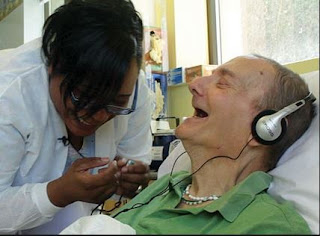 My wife, Jo, and I went to see The Force Awakens (TFA) on Christmas eve. I was excited! I loved Star Wars, and like so many parents, we had shared the Star Wars experience and memories with our children. We felt a connection! It was a family tradition!
My wife, Jo, and I went to see The Force Awakens (TFA) on Christmas eve. I was excited! I loved Star Wars, and like so many parents, we had shared the Star Wars experience and memories with our children. We felt a connection! It was a family tradition!But ... I wasn't knocked out. Entertaining, nostalgic, scary (for a woos like me), sure; but no block buster.
As chance would have it, my wife, being a lover of movies, had read a review of the 2014 documentary, Alive Inside (AI), the real-life story of how music awakens those with dementia. The following night, Christmas, we watched this film and observed profoundly demented elderly individuals come to life, dancing and singing.
Fifteen minutes into Alive Inside, it was clear that this film had already moved and awakened me beyond that which the latest Star Wars could ever hope to.
I'm not trying to be hard on TFA. But, so what if the Force is awakened in a multi-million dollar fiction film? Is a force awakened in you?
You've been entertained again. Is the world a better place? Is your life better?
Amazed by the special effects in TFA? Watch a bed-bound, institutionalized, aged person with dementia begin to sway to the music of his youth when channeled from an iPod to his headset. That's special effects!
AI shows us that there is so much force alive inside individuals, that most of us would see as empty. It shows us that many dementia patients can be happier, more calm, and more cooperative if they have access to music that moves them. It suggests that fewer expensive drugs would be necessary if inexpensive personalized music were provided therapeutically.
As I watched AI I thought:
- if music is this powerful in people who are profoundly ill, or near dead, what could it do for the rest of us?
- this is more profound evidence of the need for change in our disease-care system,
- music powerfully uplifts me; but I don't engage with it often; time for change,
- time for a monthly Dancing with the Doctor,
- most of us know that we feel better when we hear music that we love; why don't we use it more?
- I will ask around in Ojai, CA (my hometown) to see if our retirement and nursing care homes offer personalized music to their residents.
- music therapy is a #FunctionalMedicine,
- I am concerned that this film may imply that dementia is an unavoidable, bad luck condition, rather than one of many chronic degenerative diseases that are more common in those with unhealthy lifestyles,
- though not covered in this film, I hope that lots of adults will realize that we Americans need to make profound change in how we take care of ourselves, for if we don't, dementia is one of a number of lifestyle-driven diseases that will bring our Country to its knees,
http://www.aliveinside.us
https://www.functionalmedicine.org/






